TBG Blog
<< Newer Blogs | Archive | Older Blogs >>
Game development blog no.6
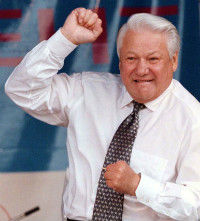
This is part of a series. You can read the previous entry here: Game development blog no.5
It's been a long, long while since we wrote a blog. A mixture of 'real life' intruding and keeping us both busy on other projects and also a lack of anything devastatingly new to report has kept us quiet, but we're back!
There's so much to write about and catch up on: the death of Thatcher, Chavez, Obama's ever-murkier drone war and the "Kissinger" wikileaks. But first let's get the boring stuff out of the way: game development update ahoy!
Kleptocracy is still bubbling under. It's not dead by any stretch, but it is a big project. Recently I've headed back to doing more research on the subject of corruption - there's something fascinating about how corruption takes root and self-propagates (and is then really difficult to get rid off). I desperately want this insidious root-taking to be an organic part of the game, but without understanding the causes better, that's never going to happen.
Meanwhile we've been steadily (and very gradually) testing and improving Drunk Prophet. Living up to its name, it's a remarkably suitable end-of-evening game for our Tuesday testing group before we get chucked out of the pub. What's interesting is that despite my desires to make the game a little more intellectually rewarding - a bit more meaningful - it's the simplest version of the game that keeps prevailing.
How to play Drunk Prophet
So here's how it plays currently: There are six decks of cards. This is the drunk prophet. The game takes place in ten rounds as the drunk prophet issues ten commandments. The topmost card is revealed from each deck in order, forming a (frequently confused) decree. All players have a hand of "theme cards". These themes are things like 'forgiveness', 'atonement', 'temptation' etc. Everyone holds the same themes and players have a short time to select a theme that they believe will represent a unique reading of the Drunk Prophet's words, but still relevant enough that it can be expanded upon. Everyone reveals their selected theme. All unique readings then get a chance to talk for 30 seconds, explaining and interpreting the Drunk Prophet's words with regard to their chosen theme. All non-playing players (those that didn't manage to select a unique theme) then vote on which disciple delivered the most compelling reading. Repeat ten times. That's it.
Can nonsense political arguments be made sense of and discussed quite normally? For me, the game has two high points: realising that anything can be interpreted is both funny and instructive. You really get a sense that authority and profundity comes not from meaning, but from context. If you read these phrases in the Bible, it's monumentally different to if you scribbled it down drunk. But the most surprising moments come when Drunk Prophet comes up with something unusually cogent and germain. I think we've encountered everything from the horrific to the genuinely thought-provoking and even the occasional moment of profundity.
Introducing ... Drunk President
On a whim, I reprogrammed my Drunk Prophet generator (yep, I've made such a thing - maybe a future app? (joking)) with a load of stock political buzz-words for the purposes of seeing if "Drunk President" was worth pursuing. Don't worry, this isn't the start of a pointless "Drunk ..." empire, there's a reason for this...
Politics was actually the original context for this whole mechanic - seeing if nonsense political arguments could be made sense of and discussed quite normally. The original goal for Drunk Prophet was something much more Orwellian - examining the potential for language to make the abnormal normal.
I decided to change the gameplay slightly: Players take it in turns to be the beleagured Press Secretary to the Drunk President. They unveil the nonsense policy and are then quizzed on this by the other players acting as the press corps. One player sits out each round and acts as the general public, allocating points to whoever they feel has swayed their opinion.
It's more raucus than Drunk Prophet - much more of a free-for-all - and it requires greater commitment. You need to embrace the role far more and perhaps it's also a little more demanding. I feel the people enjoying it most would need at least a vague knowledge of current affairs. But this is only off the back of one playtest.
Anyway, the first outing was remarkably successul. Almost depressingly so. I've strived so long for the sort of reaction the "Drunk ... " games have got - and yet to achieve it with a slightly cheap language trick is both a little frustrating and comically inevitable.
We've started work on producing some prototypes of Drunk Prophet for beta testing. This means we're fairly serious about making it. So if you'd like to help us improve and test it, get in touch and we'll start co-ordinating stuff over the next few weeks.
Posted by Andy S on 14 April 2013 - 1 comment
Comments so far:
- Wow, the "Drunk President" sounds great can't wait to purchase it!Zach Berly from North Carolina USA - 21 April 2013
Game development blog no.5

This is part of a series. You can read the previous entry here: Game development blog no.4
So what started out as a determined and candid record of development of our next large-scale game has, in fact, exposed the entirely chaotic and fractured reality of game design. I think each post has introduced at least one new game idea.
But it's not something I'm altogether unhappy with - the idea that there is ever a linear, logical process to creativity is just an illusion anyway. For some though, it is more wayward than others. So if you can forgive our constant jaunts off-piste then, without further ado, allow me to introduce the latest splinter-game ... "Drunk Prophet".
Drunk Prophet
As we keep wrestling with a rule-creation mechanic for the President in our larger project, 'Kleptocracy', we started messing with various forms of language-generators. We were looking for something that might provide a (randomly generated) framework for a law, but give the President enough wiggle room to interpret as s/he saw fit.
In the middle of an already quite involved game, this soon showed itself for what it was - lunacy. However, it did feel like it could almost support an entire game in itself, so that's what we did.
The idea of interpreting a confused and random string of words planted the scene for a religiously-themed game. Religion isn't a subject we're desperately keen to embrace to be honest - not because there's nothing to be said on religion, but it's a bit like shooting fish in a barrel. What can you say that isn't repeated ad nauseum and known perfectly well by everyone already?
However, there was something irresistibly funny about these random phrases having all the gravitas and feeling of a religious decree, but being absolutely meaningless at the same time. Make the players fight over the meaning of said random phrase and you have almost instant ingredients for some silly, faintly satirical, discussion.
But the game really only took shape recently with the title of "Drunk Prophet". This made the game itself the protagonist and the players became well-meaning but relatively helpless recipients as the Drunk Prophet spews forth. As well as vying with each other to come up with the best, unique reading of the Drunk Prophet's words, there's also an underlying spirit of we're-all-in-this-together having to deal with this crazy, drunken divinity until such a point as he passes out and we can all relax.
I am constantly reminded how framework and context - something as basic as a title sometimes, but ultimately it comes down to the narrative of the game - can radically alter how it's played and perceived.
This is such a simple party game that honestly it could almost be released tomorrow. But there are ingredients here to create something a bit more meaningful without forcing the issue. There are so many "let's laugh at funny words" party games that I don't feel there's much value in creating yet another. I still have this fantasy of using the ambiguity of the dynamically created language and feeding it back into the game - this is the step-too-far that all other language games avoid. Mainly because it's nigh-on impossible, but for now I'm still chasing that rainbow.
Posted by Andy S on 31 January 2013 - 2 comments
Comments so far:
- Chase the rainbow and shit on the leprechaun!AndyT - 10 February 2013
- It's been ages since an update - what are you working on??Sally - 9 April 2013
Game development blog no.4

This is part of a series. You can read the previous entry here: Game development blog no.3
Several weeks have passed since we last updated you on "the corruption game" - aka, Kleptocracy. We've been redesigning the game from a fundamentally different angle. Which isn't to say the first attempt wasn't working - I think there's mileage in that still - but I find a mixture of destructive and iterative approaches to game design bring out the best results.
So this new direction is inspired by - brace yourselves - Monopoly. I know what you're thinking: we're either idiots or this is another one of our cynical marketing ploys. Both, probably. The truth is, many years ago, I wouldn't dare go near Monopoly and all its heavy baggage. It's over-familiar, clichéd and hated amongst gamers (a hate that is only semi-justified, incidentally). So what's going on?
Well the core idea of Kleptocracy is that of working your way around a society, insinuating yourself in various circles, gaining influence and trying to keep others from becoming equally influence - all the while syphoning off big bucks. When we took a step back from this, it was clear that we could quite naturally represent this as your prototype, roll-and-move board track. Why not? Because it's both unoriginal and mechanically flawed (it rests on a frustrating amount of luck), that's why. But suddenly those things start to look like challenges ... Can we make a roll-and-move game that is rewarding to play and familiar-yet-different?
Additionally, while you inevitably invite the scorn and dismissal of the elite for producing something that looks superficially trite, you also make everyone else relax as they can immediately recognise something familiar and known to them. And in this day and age, giving new players a visual or emotional anchor is vital to retaining their attention while you go through the rules.
All that said, I'm clearly a little uneasy about my own choice as I'm spending so much time pre-emptively defending a design decision that hasn't even been fully implemented yet. Time will tell... Meanwhile, something within this game has lead to a new game:
Another new game? Spare us!
Sigh, yes, sorry. While trying to work out how the "make up your own rules" mechanic might work for the president in Kleptocracy, I stumbled onto the idea of laying out key rule "ingredients" and having the president interpret them or manipulate them into a new rule. I really liked the idea of the law being fuzzy and the head of state being the person to interpret the law in their own favour.
After a day of messing around with cards with single words and phrases and even making my own random word generating script, I realised this was a whole other game. And the perfect theme suggested itself - instead of a president interpreting the law, what if players were high priests interpreting the Word of God to suit their own agenda?
This seemed much more fun! I built a quick prototype in a day and we tested it last Tuesday. When I say test, I unpacked it, explained it, then repacked it again. There was a crucial flaw that would allow players to vote not for the best interpretation of the divine message (what I was after), but to vote strategically for whatever would best help them in the game. This is a pretty common problem and there are numerous work-arounds from anonymising the source to giving incentives for voting for something else that doesn't directly benefit you.
I've done neither of those and instead made it into a bit more of a bluffing game where the personal interests of each player are far less known. Let's see how it works tomorrow. My ideal is still to make a very open language game that is supported by robust scoring/ voting, but I think I need to learn a lot more about both language and player psychology before I can pull that one off.
Posted by Andy S on 17 December 2012 - 3 comments
Comments so far:
- Sounds greatV from Larkhill - 18 December 2012
- These ideas immediately made me think of The 3 Commandments, a game published in English by Rio Grande, copies of which were being flogged off for a few quid in The Works recently. There one player takes the role of high priestess, who has cards describing legal and illegal moves for a pawn on a board. The other players have to move the pawn and work out what the rules are, which could be nothing to do with the pawn, but could just as easily be to do with how they are sitting. Nothing like your ideas, other than the theme idea and some sense that one person knows 'the rules', while everyone else has to follow them. If you can find it for (I think my girlfriend paid this in some post Christmas sale thing) £3:99 - which made every one of the Rio Grande and Queen games they had worth getting so I did - get it, even if just for parts. Surely a more satirical theme for a rule mangling/guessing game would be something like funding bodies vs academics... artists vs critics (though who holds the power to determine what the rules are there?)... or celebrity chef vs customers (think Marco Pierre White chucking people out of his restaurant). Maybe a mechanic like the one used by The 3 Commandments could form a secondary mechanic in a political game, with special favour granted from the figurehead being scaled according to some absolutely pointless criteria which have nothing to do with what they think they are trying to achieve. Sorry got carried away there.Grand Master Meio from The 3rd Moon - 11 January 2013
- Looks like your project died out. You have my sympathies. In all honesty though, it's obvious it wouldn't ever make it anywhere. You'll never sell your board games when 2+2=5.Some man from a very "free" place - 29 January 2013
An early Christmas present
One year ago we launched War on Terror, the application on the App Store and were very pleasantly surprised to see it shoot high enough up the charts to (briefly) beat Risk. That's all we ever wanted from life, so thank you, everyone who contributed to that.
We've occasionally dropped the price of the app for brief periods now-and-again, more as experimentation than any planned activity. For those of you interested, mindless fiddling with pricing has very little effect on an app that has little or no exposure.
But to celebrate one year on the App Store (and let's face it, it's a small miracle we got accepted in the first place, let alone still there after a year) we've gone a bit crazy and will be making the app completely FREE, for the first time ever, for a limited period, from tomorrow: Wednesday 5th December. Get it here.
And that's not all ...
Remember that top-secret app we've been working on? No, of course you don't, it was top secret. Anyway, we're just going to leave this here for now:
Posted by TerrorBull Games on 4 December 2012 - 3 comments
Comments so far:
- Well done boys, you're in the top 20 of all games where I am. Not bad going for an indie-satire-boardgame-spin-off. What's your secret?Sandy from Cork - 6 December 2012
- Thus game is so awesome. I have not put it down. But it's like disney because it has a meaning behind it. P.S. can't wait for guantanagotchiThespywholovesterrorbull from Somewhere playing the war on terror - 17 December 2012
- You guys really open my eyes to the sort of stuff the govt. is doing and how much they twist stories in there favourVincent shoegaard from Surrey - 17 December 2012
Crunch to hit Russia

As we reported previously, Russian publishers, Igrato, are licencing Crunch and it's set to be released later this month (obviously, in Russian, just in case that's not clear).
The fun bit is that when we started talking, Igrato asked if we could include a special card for Russian audiences. That sounded like a great idea and we went through the game anew and came up with a choice of 4 possible "russacised" cards.
We tried to produce a range of card ideas from "cheeky" to "uncomfortably near the knuckle" since we didn't know Igrato's tastes at this point. Well, when we presented the cards to them, to our delight and surprise, Igrato wanted all of them.
New Russian Cards
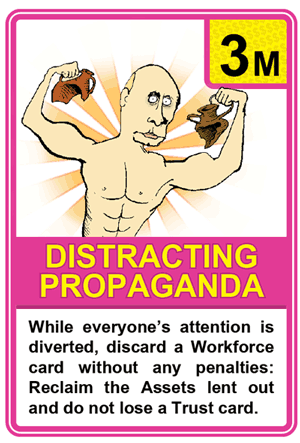
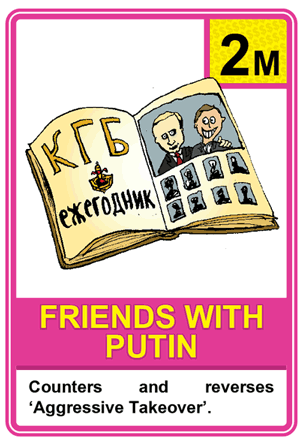
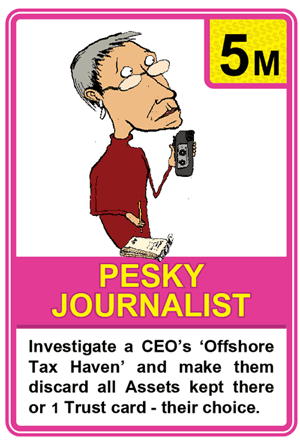
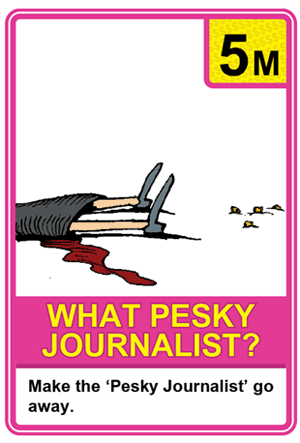
For those in need of a quick refresher, these cards refer to (left-right, top-bottom): (1) Putin supposedly "discovered" two ancient Greek urns while on his third scuba dive. He emerged with the remarkably clean artefacts just as some passing journalists were on the beach. (2) Putin rose through the ranks of the KGB and then the FSB and is widely reported to run the Kremlin in a similar manner. (The text was our attempt at translating "KGB Yearbook" into Russian. It's since been corrected!). (3) Outspoken critic of Putin and the Kremlin, Anna Politkovskaya wrote the shocking book, "Putin's Russia" and was a general annoyance to those in power. (4) Tragically, like several journalists before her, she was assassinated ... on Putin's birthday, no less.
As well as bravely licencing Crunch, Igrato are also desperately trying to find a way to bring War on Terror to Russia, using ex-military balaclavas, no less. And of course Igrato are also behind our recent interest in Russian politics and the game that is crying out to be made there. So show them some love; they're doing great work.
Posted by TerrorBull Games on 2 November 2012 - 1 comment
Comments so far:
- Any chance of releasing these as an expansion pack?James from Worthing, UK - 19 December 2012
<< Newer Blogs | Archive | Older Blogs >>
